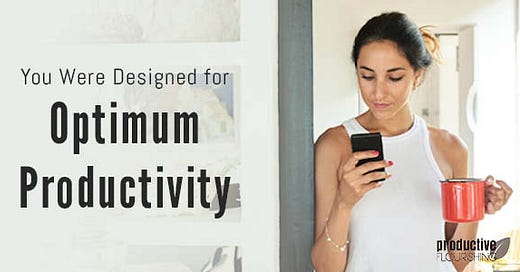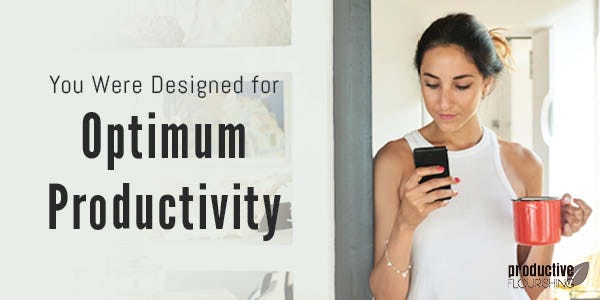You Were Designed for Optimum Productivity
Editor's Note: This is a guest post by Molly Gordon.
As I grappled with this post’s theme for the dozenth time, I found myself writing, “Who doesn’t wasn’t to be optimally productive?”
I realized a lot of us might say, “Me!”—with a caveat. We want optimal productivity if it won’t impinge on our authenticity, creativity, agency, or wellbeing. Because let’s face it, some pretty militant productivity tropes are at large in the world.
Well, here’s the good news: Optimal productivity is a side effect of functioning in accordance with your true nature, not someone else’s ideal of how you should operate. The key to optimal productivity (hinted at by the name of this blog) is for you to flourish in keeping with who you really are, to work as you were designed to work. (Tweet this.)
Let’s take a deeper look at why you’re more productive when working in alignment with who you are and what it means to enjoy (and I do mean enjoy) greater productivity and ease.
You Are a Learning Being
When you were a baby, you learned how to move through the world. For most, that meant learning to walk. Walking is an incredibly complex process involving balance, strength, coordination, and navigation, but you managed to learn how without a formal curriculum.
That’s remarkable if you think about it.
But what if, like Jen Bricker, you were born without legs? Well, you innovated other ways to move through the world. At age three, Jen saw a tumbling exhibition and told her parents she wanted to become a gymnast. Her father bought her a trampoline. She tapped her innate capacity to learn and grow and became a championship gymnast and aerialist. She’s even appeared on Dancing with the Stars!
That’s remarkable, yet to hear Jen tell it, her feat isn’t inherently more remarkable than your learning to walk. In both instances, a human being followed an emergent inclination, experimented, and, animated by the intelligence of life, accomplished something amazing.
The same premise applies to your life, work, and productivity. The better you understand your relationship to the intelligence of life, the more productive you will become while honoring your own unique design.
Learning Happens Best When We Get Out of the Way
Most of us innocently get in the way of optimal productivity because we rely on other people’s ideas about productivity rather than following our inclinations, experimenting, and allowing our natural ability to learn and adapt to take care of the rest. We entertain preconceptions, worries, and judgments about what we could or should be doing rather than playing with whatever is right in front of us.
Those things — preconceptions, worries, and judgments — generate unpleasant mental and emotional static. If we mistakenly attribute the unpleasant feelings to our circumstances or activities instead of our ideas about productivity, we will naturally avoid engaging in those circumstances and activities.
In short, we become unproductive.
I liken the situation to an athlete who gets so caught up in the play-by-play commentary that he or she stops being fully present, loses focus, and becomes less effective. I’ve never met a human being who doesn’t recognize this dilemma. We’ve all been distracted by something and lost our “oomph” for the task at hand. At the same time, I’ve also never met a human being who hasn’t, sooner or later, stopped being preoccupied by the commentary. As soon as attention returns to the present moment, effectiveness increases.
And that’s what I invite you to reflect on.
Sooner or later, often in spite of ourselves and all the layers of commentary, we return to the present moment and find a groove.
When we’re in a groove, productivity is a given. We effortlessly filter distractions, tackle complex problems, and use a variety of tools, techniques, or strategies to get the job done. If we don’t have what we need, we innovate.
The groove (also known as being in the zone or flow) emerges as we work. It arises naturally as we settle down and tune ever more keenly into each present moment. A groove is inherently improvisational. It arises from engaging with what is happening NOW and NOW and NOW.
Which brings us back to this key insight: At any given moment we are either in the game or preoccupied with commentary. When we’re in the game, we experience increased presence, focus, responsiveness, and creativity. We are surprisingly immune to physical and psychological discomforts. It’s not that they don’t exist; they do. It’s just that in the moment, we don’t find them significant.
When we are preoccupied with commentary, we experience increased insecurity, distractibility, self-absorption, and “stuckness.” Physical and psychological discomforts are magnified, too.
When we give time, energy, and attention to the game, we get better at playing and productivity increases. But when we give time, energy, and attention to commentary, we get worse at playing and productivity declines.
The differentiator is your attention and whether it is on the game or on your commentary about the game.
You Can Feel the Difference for Yourself
At this point, you probably want to know how to keep your attention on the game and off the commentary. But beware: someone else’s good idea about how to manage your attention has a high likelihood of adding to the commentary.
Your best bet is to allow your innate intelligence to educate you. Start by setting an intention to become more aware of the difference between attending to the game and attending to the commentary. Without trying to manage your attention, allow yourself to notice how it feels to engage with life instead of paying attention to the commentary.
In time you’ll notice you’re in the game more and the commentary less. That happens because engaging with life simply feels and works better than getting caught up in the commentary. It is also the shortest path to optimal productivity because it’s a path custom-tailored to who you are, not who you think you should be.




